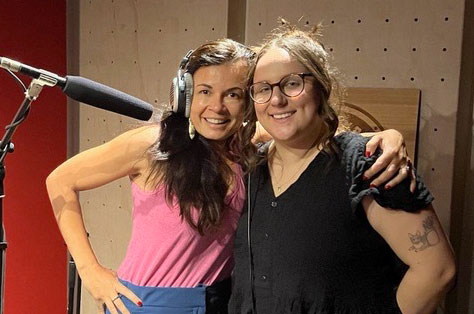There are 2.65 million unpaid carers in Australia and at least 235,000 of these are young carers.
Young carers, who are aged 25 or under, are often unseen in the role of carers. They see what they do for the person they care for as part of their responsibility as a friend or family member.
Patty Kikos, host of our Carer Conversations podcast, interviewed Carer Gateway Young Carer Coordinator, Jessica Dallish, in a new episode entitled, From Being a Young Carer to Now Advocating for Them.
In her role, Jessica curates amazing experiences for young carers to feel less isolated, as well as training qualification opportunities that will assist them in the workplace.
“Many young carers, much like their older counterparts, find themselves inheriting this role, and often don't even realise that it's more than just being part of a family,” Patty says. “In fact, it's something very specific and many times is accompanied with a great sense of responsibility that other adolescents and other young adults don't necessarily have to contend with.”
During their insightful chat, Jessica shared her experience of growing up as a young carer for her older brother, along with the challenges she navigated and the ways she transcended them. Below are some highlights:
What does your role as a Young Carer Coordinator actually entail?
My job is one that is so insanely fulfilling and honestly, I sometimes can't believe that I get to wake up and do what I get to do every day, especially alongside the most incredible people in our team and all these insanely inspiring carers.
A huge part of my role involves a lot of planning. So that includes organising all of the upcoming activities and events we have for Young Carers, while also managing individual clients.
This could include organising personal support, so on an average day this means managing the packages they access. So, for example, arranging care workers that come to the house and offer respite within home support; it could be scheduling tutoring sessions to help the young carer with their studies or organising driving lessons.
It basically revolves around working with the young carer on finding out what individual support they need and then tailoring our services for them specifically so that they get the most benefit.

Pictured above: Patty Kikos and Jessica Dalish at the podcast recording studio.
Now every young carer has a unique experience in their role. What were the biggest challenges that you faced?
I personally found that my biggest challenge was juggling the caring role with all the other aspects of everyday life, especially when it came to studies and work.
So for me there were a few years from high school to university where I was studying full time, working sometimes multiple jobs and all while trying to manage the extra responsibilities that I was picking up at home.
So as you can imagine, time management was a huge struggle and something that took a lot of practice to get good at.
If you had a piece of advice for someone who is struggling in life, and certainly with their responsibilities as a young carer, what would you share with them?
I think it would have to be that you are the motivator of your own change, so if there's something in your life, especially in your caring role, responsibilities that you're struggling with, take a step back and genuinely reflect on what can be done to change the issue.
Is there anything you know now that you wish you had known when you were a young carer yourself, particularly in your most challenging moments?
I personally felt growing up, and again I hear so often from my young carers, how easy it is to feel that your caring role consumes you, and that the needs of the person you're caring for, can often feel more important than your own.
I think it's so insanely important for all of our carers, and in particular young carers, to know that there's so much more to life than just being a carer and that even though a caring role can be something that demands a lot of time and effort and attention, it isn't your defining characteristic - so you're this whole human outside of the person that you care for.
And you are capable of so many incredible things.
I think it's really critical for carers to try to prioritise investing in themselves as much as they focus on the care recipient, just so that they don't feel consumed by the caring role. Whether that's making small pockets of time where you can step out of the caring role completely and do something for yourself, or even if it's setting boundaries with the care recipient, where you start to learn how to say no in some situations, just to put your own needs first.
So, if I could tell my young carer self anything, it’s that you are far more important than just your caring role, and that your own needs are as equally as important as the person next to you.
To listen to the interview in full, subscribe to ‘Carer Conversations’ wherever you listen to your podcasts including Apple, Spotify and other platforms. For more information on The Benevolent Society’s Carer Gateway program and podcast, click here.
If you’re caring for a family member or friend with disability, mental illness, a medical condition, or they are frail due to age, contact Carer Gateway on 1800 422 737 Monday to Friday between 8am and 5pm or visit the website carergateway.gov.au